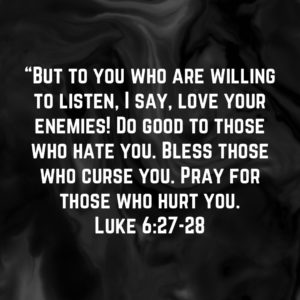When Forgiveness Feels Impossible

We have all been there. Betrayal. Rejection. Abandonment. A painfully deep wound that plays and replays itself over and over in your mind, triggering a hurt that is pumped right out of your aortic chamber to every body extremity; only to return back to and straight through your heart.
Being wronged can keep one trapped in recirculated pain indefinitely. This is because it is usually tied to someone you care strongly for… a friend, a family member, a spouse. It can even turn your world upside down because of the vulnerability you entrusted to a person you thought would protect it and hold it sacred…only to have it stomped on.
When wronged like this, our natural inclination is an internal scream for justice. For vindication. For retribution. Sometimes we take action. Sometimes we take revenge. We tell the world of the wrong and then in anger and vitriol we let that person know exactly what we think of them. Other times we silently envision their destruction in the darker parts of our dreams. But rarely does that satisfy. Often what that does is only anger and enrage us even more.
So what then? How do we live with the wounds? How do we escape the recirculated pain? How can we finally be free? …The antidote we frequently hear about is forgiveness. But how? HOW do we forgive something so deeply painful? HOW do we forgive someone who deserves the same thing they dished out? HOW do we forgive when forgiveness feels impossible?? Here are 7 tangible steps that can help you move toward forgiveness.
STEP 1: Understand Forgiveness.
The first thing to remember is that forgiveness is not forgetting. It is not the justification of an act. It is also not a free and immediate restoration of trust. It is the recognition and identification of the debt someone owes you, and then the intentional willing decision to let it go. The truth of the matter is that when someone “owes” us, we forever remain in bondage by waiting around for that debt to be repaid. And as we wait, we vacillate between anger and hurt as time wars on without repayment. Even if the offender apologizes, the situation may not change right away if trust has been broken. So ultimately, forgiveness is more for the offended than for the offender. It is YOUR release from the debt-wound. It is YOUR choice to stop waiting around for an apology or for a changed situation.
STEP 2: Keep moving forward
Forge on. Sometimes we can get stuck in life again because we are waiting for justice or repayment. We sink into bitter resentment and it begins to poison every other avenue of our life. So easy to become short at work, frustrated with the kids, even edgy with spouses, parents or friends. This is why un-forgiveness is so toxic. It can literally change your personality and reduce your productivity. When the wound and its pain is front and center, day in and day out, we stop moving forward. In this step, look for all the positives in your life and cling hard to those. Enjoy them. Let them make you smile and steal you away from the wound. Put one foot in front of the other and keep going. If that relationship has ended, you are now facing a hole in your life. Look to other friendships, supportive relationships and other healthy ways to fill that hole. The hole won’t go away by itself. It needs to be refilled. If your marriage has ended, take time for yourself…to heal, to find yourself and your identity apart from your spouse. Invest in others and beware the rebound. If you are not in an emotionally healthy place and have not successfully processed and evaluated what went wrong in your marriage, a rebound relationship may leave you even more confused and destroyed.
STEP 3: Switch focus from blaming to attempting to understand
The blame game is a nasty trap. Super tempting to highlight (multiple times and even with every color in the highlighter box) all of the mistakes of the offender, identifying every which way they are to blame for the situation you are currently now in. But again, this fuels the bitterness and hardens the heart. In this step, make a conscious effort to try to understand where the offender might be coming from. This is the pathway to empathy; and empathy softens the heart. Therapists use this all the time when dealing with difficult clients. I have had clients curse me out and threaten me more times than I care to count; and yet I must respond kindly, respectfully, and calmly. But understanding their anger and words are coming from a place of pain helps my heart to react in love rather than returning the hate.
STEP 4: Own your part in it
You may be completely innocent in the final conflict. But the truth is, no one is perfect and if you think hard enough, you will find your own part in the original problem. Own it. Take responsibility for the mistakes you made that contributed to the way you were wronged. It can be torturously difficult to apologize for your part in something that hurt you more than it hurt them (or seemed to, from your point of view;). But there is phenomenal power in an apology. It is a peace offering toward either restoration and reconciliation, or… closure. Regardless of how the situation turns out, you can move forward in peace, knowing you owned your part, letting go of blame.
STEP 5: Be kind instead of right
This is another tough one. Within that intense longing for justice is the desire to be right… for everyone to know you were right… including the offender. However arguing does not bring you peace; it only fuels the conflict as anger and disrespect tend to flare up and then get slingshot-hurled in blazing fireballs that end up crashing and burning. If you are going to throw anything at the offender, throw love, joy, peace and kindness. Again, this is difficult to do when you are mad and hurt. But this humble approach is the concept of de-escalation, and it works! Not only does it keep you in a place of peace and calm, but it also calms the offender (if they have escalated). If they are shouting and name-calling but you quietly and kindly respond, eventually they will bring it down a notch, and then another notch when you don’t match their same level of emotionality. Love wins. Not arguments.
STEP 6: Stop looking for more reasons to be offended
Once offense and anger unite, it’s quite easy to dwell on the injustice and not only that, but to then begin picking apart the entire character of the offending individual, identifying everything wrong with that person. It’s almost natural to take a magnifying glass also to the situation, brain-scouring every moment of the hurtful experience and pin-pointing more offenses along the way. But as anyone who has done this would agree, it blows everything up even worse! Anger escalates! Pain intensifies! And justice seems even further away. Why do we do this to ourselves?? Moving toward freedom from the pain and the debt-wound requires we no longer torture ourselves with this. While anger may feel empowering and fault-finding may further satisfy our need for self-vindication, we still end up alone and then crushed with a new, added weight at the end of the day.
STEP 7: Let go
So much easier said than done. But ultimately, this step is really the end result of all the other steps. It is when you have come to the understanding that forgiveness is meant for your own release; it is recognizing that staying in anger actually keeps you in bondage to that person… it gives THEM control; it grants THEM the power over your happiness. So take your joy back. Focus on other passions, pursuits, and other relationships that have meaning to you. Move forward. One foot in front of the other. And as you do so, switch your focus from a position of blame to an empathic attempt to understand what drove that person to do what they did. Recognize your own role in the situation and own it. It takes two to tango. Let yourself be humbled, even if your role may have been small. As you begin to understand their wounds and acknowledge your own mistakes, your heart will be softened. This heart-softening will then allow kindness, peace and warmth to pour out of you… toward that person, and toward others! While justice may still be your underlying desire, you have now been empowered to let go of your need to argue (which brings you nowhere anyway). And then release the obsessive thinking; turn off the instant replay and watch the rest of the game! The game of life is so much bigger than the 7-second foul. And the game isn’t over yet! Let go of the foul. Don’t let it steal your enjoyment of the game. Don’t let it cost you the victory.

**** BONUS STEP: Spiritual Healing
This is the bonus step for those interested in a deeper, spiritual perspective. The two keys for this one is 1)Prayer and 2)Surrender. Pray for the one that wronged you. This is super duper tough!! Your prayers may actually start out along the lines of “God, I know you said vengeance is yours, so please go ahead and do that now, thanks!” But the wild thing about praying for the very person that hurt you, is that over time, it changes YOU. As you draw closer to God, He will begin to give you HIS heart. Watch your prayers evolve from an “avenge me God” to a “help me see this person the way YOU do,” and then to “help me love them,” and then to prayers even for that person’s own healing and beyond. What comes out of this incredible journey is a personal movement from anger and hate, to freedom and love. The second concept of surrender is in relation to God. Giving it over to Him. We must let go of the offense and let go of the need to gain payment and retribution. Essentially we are letting go of the anxiety that comes along with our failed attempts to control. We ultimately have no control over the situation, over whether or not reconciliation will or even should take place. But if we relinquish control over to the One who is IN control, we can rest in the peaceful reassurance that our wounds will be healed, and whatever is meant to be will be.


